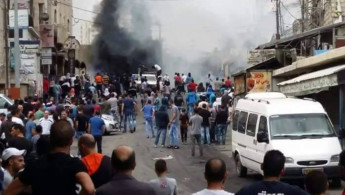East Jerusalem's Shufat refugee camp witnesses week of violence
"It started with 19-year-old Subhi Abu Khalifa from the Shufat camp," Faisal Rafai, the spokesman of the refugee camp outside East Jerusalem, says.
"He tried to carry out an 'operation' against Israeli forces in Jerusalem City," Rafai explains.
The Shufat camp has been at the centre of recent escalation in Palestine.
| A Palestinian youth from the camp tried to throw a stone at the soldiers, and an Israeli sniper shot him in the chest |
The violence has followed on from clashes at al-Aqsa mosque in Jerusalem, the failure of negotiations and the killing of unarmed Palestinians.
Located on the old Jerusalem-Ramallah road about three miles north of the Old City, Shufat camp has a population of around 35,000 residents.
Recently, some young Palestinians from the camp have been attempting to attack Israeli settlers and military, facing almost certain death, in retaliation to the growing unrest around the region.
"Subhi was killed in the settlement and afterwards the Israeli army tried to break into his home in the Shufat camp," Faisal said.
"Big clashes started between the Israeli army and Palestinian people in the camp, and there were armed clashes."
"Eman Wisam al Manse [another Palestinian youth from the camp] tried to throw a stone at the soldiers, and an Israeli sniper shot him in the chest," Faisal added.
"After Wisam was killed, around a hundred guys in the camp began screaming against the occupation. The soldiers then tried to bomb Subhi’s home, but failed."
Pattern of destruction
Israeli forces have been destroying homes of those who have carried out, or attempted to carry out operations against the army or settlers.
"At night we buried him, after that big clashes happened again at Shufat checkpoint," Faisal said.
The clashes continued through to Friday.
"There were many injuries, most of them by rubber bullets," Faisal said.
On Friday night, 22-year-old Ahmed Salah, from the same camp, tried to shoot a soldier on the Israeli checkpoint.
"Witnesses said he wasn’t shooting the soldier but just standing near them," Faisal pointed out.
"But the Israeli police spokeswoman said that he had apparently fired shots at two soldiers. The soldiers then opened fire and killed him.
"He was still alive after the first shot, but the forces then fired an additional three shots. They then took him to the middle of the checkpoint," the camp's spokesman added.
Palestinians then crowded at the checkpoint and huge clashes erupted, Faisal explained, adding that Israeli soldiers used live ammunition and rubber bullets.
According to some medical centres, 88 Palestinians were injured – seven by live bullets.
"There were not enough ambulances," Faisal said. "All of this happened in the space of four hours, between Friday 11pm and Saturday 3am." The clashes continued to Saturday morning and Ahmad was buried the same night.
Clashes continue
After Ahmad's funeral, clashes at the Shufat checkpoint broke out again, moving on to Anata village, a Palestinian town in central West Bank.
Mohammad Saaed Mohammad Ali, 21, was then killed on Saturday, after injuring three Israeli policemen on Bab al Amood street in Jerusalem.
"The clashes stopped to bury Mohammed Ali," Faisal said.
However, Israel refused to give back the 21-year-old's body, claiming that there was a ruling from the Israeli court, Faisal told al-Araby, adding that they were told to wait until Sunday.
With a week of killings of young Palestinians from the same camp, Faisal sees very little sign of clashes ending any time soon.
"The relationship between the people of Palestine and Israeli forces are too bad. Israel gave everything to the settlement and that is a huge problem to the Palestinian people in Jerusalem," he said.
In the Shufat camp itself, Israel has all the authority.
In some of the surrounding villages such as Anata, Israel is in charge of security, whereas the Palestinian Authority [PA]is in charge of administrative affairs.
"The Palestinian Authority have keep silent, until now," Faisal says.
"But they have previously said that because this area is not with us, it is not our business. That's why I think, even this time round, nothing will be done," Faisal adds.



